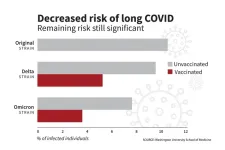(Press-News.org) The risk of developing long COVID has decreased significantly over the course of the COVID-19 pandemic, according to an analysis of data led by Washington University School of Medicine in St. Louis.
Researchers attributed about 70% of the risk reduction to vaccination against COVID-19 and 30% to changes over time, including the SARS-CoV-2 virus’s evolving characteristics and improved detection and management of COVID-19.
The research is published July 17 in The New England Journal of Medicine.
“The research on declining rates of long COVID marks the rare occasion when I have good news to report regarding this virus,” said the study’s senior author, Ziyad Al-Aly, MD, a Washington University clinical epidemiologist and global leader in COVID-19 research. “The findings also show the positive effects of getting vaccinated.”
Long COVID encompasses the lingering and debilitating effects on health experienced by about 10% of people who have been infected with COVID-19. To date, the World Health Organization has documented more than 775 million cases of COVID-19.
In more than 30 high-profile studies, Al-Aly has detailed the virus’s indiscriminate, long-term health impacts across nearly all organ systems affecting the heart, brain, kidneys and gastrointestinal (GI) tract.
Although his latest findings sound more reassuring than previous studies, Al-Aly tempered the good news. “Long COVID is not over,” said the nephrologist, who treats patients at Washington University-affiliated John J. Cochran Veterans Hospital in St. Louis. “We cannot let our guard down. This includes getting annual COVID vaccinations, because they are the key to suppressing long COVID risk. If we abandon vaccinations, the risk is likely to increase.”
Since the pandemic’s beginning, Al-Aly has dedicated himself to analyzing long COVID with the aim of helping the public make informed health choices; supporting scientists in generating research-backed recommendations on prevention and treatment; and enabling politicians to make educated decisions regarding funding and public policies. Al-Aly’s latest study builds on this body of work by examining the virus’s variants and overall evolution.
To do this, Al-Aly and his team analyzed millions of de-identified medical records in a database maintained by the U.S. Department of Veterans Affairs, the nation’s largest integrated health-care system. The study included 441,583 veterans with SARS-CoV-2 infections and more than 4.7 million uninfected veterans, from March 1, 2020, through Jan. 31, 2022.
Patients included people of diverse ages, races and sexes; statistical modeling ensured parity in representation.
The researchers divided the veterans into five groups: unvaccinated COVID-19 sufferers who acquired the original strain in 2020; the delta variant in 2021; and the omicron variant in 2022. The other two groups included vaccinated people who had the delta variant, and vaccinated people with omicron. No vaccines existed while the original strain circulated.
The team estimated rates of long COVID one-year postinfection for each of the five groups.
Unsurprisingly, the rate of long COVID was the highest among those with the original strain, Al-Aly said, with 10.4% of those who had infections that developed into long COVID.
That declined to 9.5% among those in the unvaccinated groups during the delta era and 7.7% during omicron.
Among the vaccinated, the rate of long COVID during delta was 5.3% and 3.5% during omicron.
“You can see a clear and significant difference in risk during the delta and omicron eras between the vaccinated and unvaccinated,” said Al-Aly, who is also director of the Clinical Epidemiology Center at the VA St. Louis Health Care System and head of the research and development service. “So, if people think COVID is no big deal and decide to forgo vaccinations, they’re essentially doubling their risk of developing long COVID.”
Al-Aly also emphasized that even with the overall decline, the lowest rate — 3.5% — remains a substantial risk. “That’s three to four vaccinated individuals out of 100 getting long COVID,” he said. “Multiplied by the large numbers of people who continue to get infected and reinfected, it’s a lot of people. This remaining risk is not trivial. It will continue to add an already staggering health problem facing people across the world.”
Since the pandemic’s beginning, Ziyad Al-Aly, MD, a clinical epidemiologist at Washington University School of Medicine in St. Louis, has dedicated himself to analyzing long COVID with the aim of helping the public make informed health choices and educating scientists and policymakers on prevention and treatment. Al-Aly’s latest study in The New England Journal of Medicine builds on his research by examining the virus’s variants and overall evolution.
Another notable finding offers clues to the virus’s evolution, Al-Aly added. While analyzing the risk among all people infected with COVID-19 during the omicron era of 2022, the likelihood of heart, brain, kidney and lung problems declined. In contrast, diseases and illnesses associated with metabolic function and the GI system increased.
“People tend to think of SARS-CoV-2 as a homogeneous virus,” Al-Aly said. “But each variant has its own fingerprint. The original virus hit the respiratory system hard. Omicron targeted metabolic and GI issues. It’s important because while the risk of long COVID is quantitatively lower, a person can be at a higher risk of developing an illness based on the part of the body that the COVID variant targets.
“It’s really good news that the risk has declined,” he said. “But we know millions of people already have long COVID, and millions more will continue to get long COVID. We need to double down on our efforts to understand it so we can prevent suffering and treat affected individuals.”
Xie Y, Choi T, Al-Aly Z. Post-acute Sequelae of SARS-CoV-2 in the Predelta, Delta and Omicron eras. The New England Journal of Medicine. July 17, 2024. DOI: www.nejm.org/doi/full/10.1056/NEJMoa2403211
This research was funded by the U.S. Department of Veterans Affairs.
About Washington University School of Medicine
WashU Medicine is a global leader in academic medicine, including biomedical research, patient care and educational programs with 2,900 faculty. Its National Institutes of Health (NIH) research funding portfolio is the second largest among U.S. medical schools and has grown 56% in the last seven years. Together with institutional investment, WashU Medicine commits well over $1 billion annually to basic and clinical research innovation and training. Its faculty practice is consistently within the top five in the country, with more than 1,900 faculty physicians practicing at 130 locations and who are also the medical staffs of Barnes-Jewish and St. Louis Children’s hospitals of BJC HealthCare. WashU Medicine has a storied history in MD/PhD training, recently dedicated $100 million to scholarships and curriculum renewal for its medical students, and is home to top-notch training programs in every medical subspecialty as well as physical therapy, occupational therapy, and audiology and communications sciences.
END
Risk of long COVID declined over course of pandemic
Drop attributed mostly to vaccination but remaining risk still significant
2024-07-17
ELSE PRESS RELEASES FROM THIS DATE:
Learning from Venus: Combining earth system sciences with planetary sciences
2024-07-17
The University of Freiburg is establishing a new tenure track professorship in Earth and Planetary Geodynamics at the Faculty of Environment and Natural Resources, made possible by a 1.71 million euro grant from the Volkswagen Foundation. The new tenure track professorship is part of a comprehensive strategic initiative for combining Earth system sciences with planetary sciences at the University that also includes the establishment of a new Earth System Simulation Lab (EaSySim) and the introduction of an Earth Sciences ...
Texas A&M researchers receive $5 million to study brucellosis in Armenia
2024-07-17
A research team at the Texas A&M School of Veterinary Medicine and Biomedical Sciences (VMBS) has received a $5 million grant from the United States Department of Defense’s Defense Threat Reduction Agency to support the detection and prevention of brucellosis in Armenia.
Brucellosis, which is caused by several bacterial species of Brucella, is a zoonotic disease that can spread to humans from dogs and major livestock species, including cattle, pigs, sheep, and goats. It can have a major impact on a country’s public health and agricultural economy.
The team of Texas A&M researchers, led by VMBS Associate Professor Dr. Angela Arenas, will ...
How effective is MS medication across racial and ethnic groups?
2024-07-17
MINNEAPOLIS – For people with relapsing-remitting multiple sclerosis (MS), a new study has found that the drug ofatumumab is more effective than teriflunomide at helping people across racial and ethnic groups reach a period of no disease activity. The study is published in the July 17, 2024, online issue of Neurology®, the medical journal of the American Academy of Neurology. Ofatumumab, a monoclonal antibody, is a newer drug for treating MS. Teriflunomide, an immunomodulatory agent, has been available for over a decade.
MS is a disease in ...
Study: Uninsured, Hispanic people less likely to be referred to care after stroke
2024-07-17
MINNEAPOLIS – Insurance coverage, ethnicity and location may all play a role in a person’s ability to receive care after a stroke, according to a study published in the July 17, 2024, online issue of Neurology® Clinical Practice, an official journal of the American Academy of Neurology.
“Receiving the right care after a stroke is crucial to recovery and minimizing disability,” said study author Shumei Man, MD, PhD, of the Cleveland Clinic in Ohio and a member of the American Academy of Neurology. “Unfortunately, decisions about care may be influenced by factors such as race, insurance, and geographic location. Our study ...
Most Afghans support women’s rights, especially when men think of their daughters
2024-07-17
A majority of people in Afghanistan support human rights for Afghan women, and men are especially likely to support women’s rights when primed to think about their eldest daughters, according to a study published July 17, 2024, in the open-access journal PLOS ONE, by Kristina Becvar and colleagues from the University of Massachusetts at Amherst.
Human rights groups have been concerned for the rights of Afghan women in particular since the Taliban took control of Kabul in 2021. Since then, Afghan ...
New antidote for cobra bites discovered
2024-07-17
Scientists at the University of Sydney and Liverpool School of Tropical Medicine have made a remarkable discovery: a commonly used blood thinner, heparin, can be repurposed as an inexpensive antidote for cobra venom.
Cobras kill thousands of people a year worldwide and perhaps a hundred thousand more are seriously maimed by necrosis – the death of body tissue and cells – caused by the venom, which can lead to amputation.
Current antivenom treatment is expensive and does not effectively ...
Ant insights lead to robot navigation breakthrough
2024-07-17
Have you ever wondered how insects are able to go so far beyond their home and still find their way? The answer to this question is not only relevant to biology but also to making the AI for tiny, autonomous robots. TU Delft drone-researchers felt inspired by biological findings on how ants visually recognize their environment and combine it with counting their steps in order to get safely back home. They have used these insights to create an insect-inspired autonomous navigation strategy for tiny, lightweight robots. The strategy allows such robots to come back home after long trajectories, while requiring extremely little computation and memory (0.65 kiloByte per ...
Soft, stretchy ‘jelly batteries’ inspired by electric eels
2024-07-17
Researchers have developed soft, stretchable ‘jelly batteries’ that could be used for wearable devices or soft robotics, or even implanted in the brain to deliver drugs or treat conditions such as epilepsy.
The researchers, from the University of Cambridge, took their inspiration from electric eels, which stun their prey with modified muscle cells called electrocytes.
Like electrocytes, the jelly-like materials developed by the Cambridge researchers have a layered structure, like sticky Lego, that makes them capable of delivering an electric current.
The self-healing jelly batteries can stretch ...
The most endangered fish are the least studied
2024-07-17
The most threatened reef fishes are also the most overlooked by scientists and the general public. That is the startling finding of a team of scientists led by a CNRS researcher.1 In a study to be published in Science Advances on July 17, they measured the level of human interest in 2,408 species of marine reef fish and found that the attention of the scientific community is attracted by the commercial value more than the ecological value of the fishes. The public, on the other hand, is primarily influenced by the aesthetic characteristics of certain species, such as the red lionfish ...
Mindfulness training may lead to altered states of consciousness, study finds
2024-07-17
Mindfulness training may lead participants to experience disembodiment and unity – so-called altered states of consciousness – according to a new study from researchers at the University of Cambridge.
The team say that while these experiences can be very positive, that is not always the case. Mindfulness teachers and students need to be aware that they can be a side-effect of training, and students should feel empowered to share their experiences with their teacher or doctor if they have any concerns.
Mindfulness-based programmes have ...
LAST 30 PRESS RELEASES:
Pekingese, Shih Tzu and Staffordshire Bull Terrier among twelve dog breeds at risk of serious breathing condition
Selected dog breeds with most breathing trouble identified in new study
Interplay of class and gender may influence social judgments differently between cultures
Pollen counts can be predicted by machine learning models using meteorological data with more than 80% accuracy even a week ahead, for both grass and birch tree pollen, which could be key in effective
Rewriting our understanding of early hominin dispersal to Eurasia
Rising simultaneous wildfire risk compromises international firefighting efforts
Honey bee "dance floors" can be accurately located with a new method, mapping where in the hive forager bees perform waggle dances to signal the location of pollen and nectar for their nestmates
Exercise and nutritional drinks can reduce the need for care in dementia
Michelson Medical Research Foundation awards $750,000 to rising immunology leaders
SfN announces Early Career Policy Ambassadors Class of 2026
Spiritual practices strongly associated with reduced risk for hazardous alcohol and drug use
Novel vaccine protects against C. diff disease and recurrence
An “electrical” circadian clock balances growth between shoots and roots
Largest study of rare skin cancer in Mexican patients shows its more complex than previously thought
Colonists dredged away Sydney’s natural oyster reefs. Now science knows how best to restore them.
Joint and independent associations of gestational diabetes and depression with childhood obesity
Spirituality and harmful or hazardous alcohol and other drug use
New plastic material could solve energy storage challenge, researchers report
Mapping protein production in brain cells yields new insights for brain disease
Exposing a hidden anchor for HIV replication
Can Europe be climate-neutral by 2050? New monitor tracks the pace of the energy transition
Major heart attack study reveals ‘survival paradox’: Frail men at higher risk of death than women despite better treatment
Medicare patients get different stroke care depending on plan, analysis reveals
Polyploidy-induced senescence may drive aging, tissue repair, and cancer risk
Study shows that treating patients with lifestyle medicine may help reduce clinician burnout
Experimental and numerical framework for acoustic streaming prediction in mid-air phased arrays
Ancestral motif enables broad DNA binding by NIN, a master regulator of rhizobial symbiosis
Macrophage immune cells need constant reminders to retain memories of prior infections
Ultra-endurance running may accelerate aging and breakdown of red blood cells
Ancient mind-body practice proven to lower blood pressure in clinical trial
[Press-News.org] Risk of long COVID declined over course of pandemicDrop attributed mostly to vaccination but remaining risk still significant









